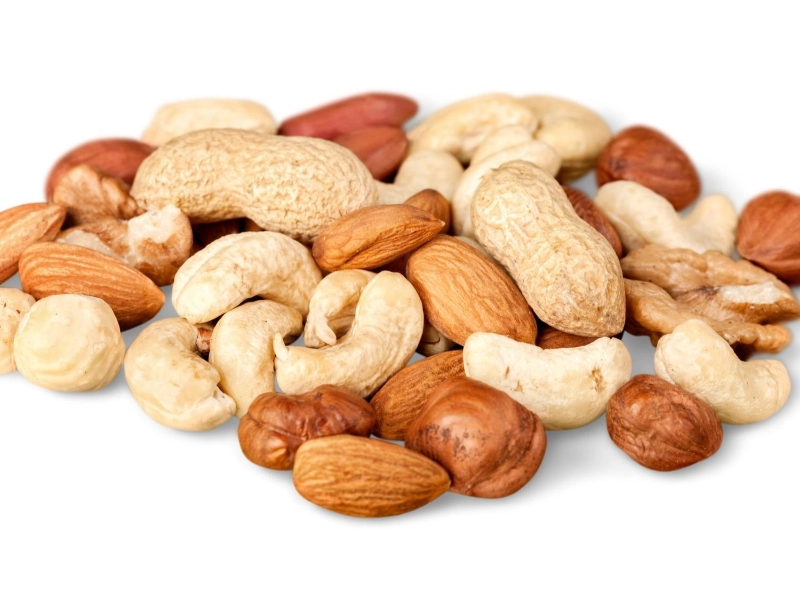How Nuts Can Help in Managing Seasonal Allergies
Value of Cognitive Well-Being
Maintaining mental clarity, memory, and general brain power requires cognitive wellness. Our cognitive skills may drop with aging, which would cause problems including forgetfulness and trouble focusing. A proactive approach to improve cognitive performance and lower the risk of neurodegenerative illnesses is supporting brain health by nutrition. Among all the foods, nuts are a nutritional powerhouse that can greatly improve cognitive function and brain health.

Nutritional Analysis of Nuts
Nutrient-dense foods high in good fats, protein, vitamins, and minerals are nuts. Each of the common varieties—walnuts, almonds, hazelnuts, and pistachios—offers special health advantages. Especially high in omega-3 fatty acids, antioxidants, and vital vitamins including vitamin E and B vitamins are they. Supporting brain function, shielding against oxidative stress, and enhancing general cognitive health—these nutrients are absolutely vital.
Brain Function with Omega-3 Fatty Acids
Brain function depends on omega-3 fatty acids, most specifically alpha-linolenic acid (ALA). Among the finest sources of omega-3s available from plants are walnuts. Maintaining the structure of brain cells and enabling neuron-to-neuron communication depend on these fats. Studies of a diet high in omega-3s have found that it can boost memory, increase mood, and lower cognitive decline risk. Including walnuts in your diet will help your brain capacity to be much enhanced.

Antioxidants: Their Defensive Function
Antioxidants abound in nuts as well, which assist in brain oxidative stress control. Oxidative stress results from an imbalance between free radicals and antioxidants in the body causing cellular damage. Found largely in almonds and hazelnuts, vitamin E is a potent antioxidant that shields brain cells. Studies point to a reduced risk of Alzheimer's disease and cognitive impairment as we age linked with appropriate vitamin E intake.
B Vitamins: Their Function
Brain health and cognitive ability depend critically on B vitamins, particularly B6, B12, and folate. These vitamins maintain normal brain cells and help to synthesize neurotransmitters. Especially almonds and pistachios, nuts offer vital B vitamins that help brain energy metabolism. A diet high in B vitamins can lower cognitive risk, boost memory, and help mood.

Cognitive Performance and Healthy Fats
Mostly monounsaturated and polyunsaturated, the beneficial fats in almonds help to lower bodily inflammation and increase blood flow. These fats support the energy demands of the brain and assist to preserve ideal cognitive ability. Consuming nuts regularly can improve general brain function, therefore enhancing memory, concentration, and attention span. Including nuts in your diet will help you to experience these cognitive advantages and support heart health as well.
How Might You Incorporate Nuts into Your Diet?
Including nuts in your everyday schedule is easy and flexible. Raw, roasted, or as nut butter—they can all be savored. Sprinkling nuts on oatmeal or yogurt will make your breakfast interesting. Spoon nut butter on whole-grain toast or in smoothies as a spread. For added taste and nutrients, nuts can also be included to salads, stir-fries, or baked products. Reaping the cognitive advantages of nuts will depend on your ability to creatively add them into your meals.

Control of Portions for Maximum Advantage
Though they are quite nutritious, nuts have a lot of calories. Reducing too high calorie consumption requires practice in portion control. Most persons would be suited for a little handful, roughly one ounce or 28 grams. This level offers a reasonable mix of nutrients without packing too much calories. Knowing your portion amounts helps you to enjoy the advantages of nuts without sacrificing your general nutritional goals.
Nutritional Summary for Cognitive Enhancement
Natural and efficient means of assistance for cognitive function and brain power enhancement are nuts. Any diet would benefit from their great concentration of omega-3 fatty acids, antioxidants, and B vitamins. While enjoying their great tastes, a range of nuts will help to maintain brain function by including them into your meals and snacks. Using portion management and using nuts regularly in your diet can help you maximize their cognitive advantages and improve your general wellness.








